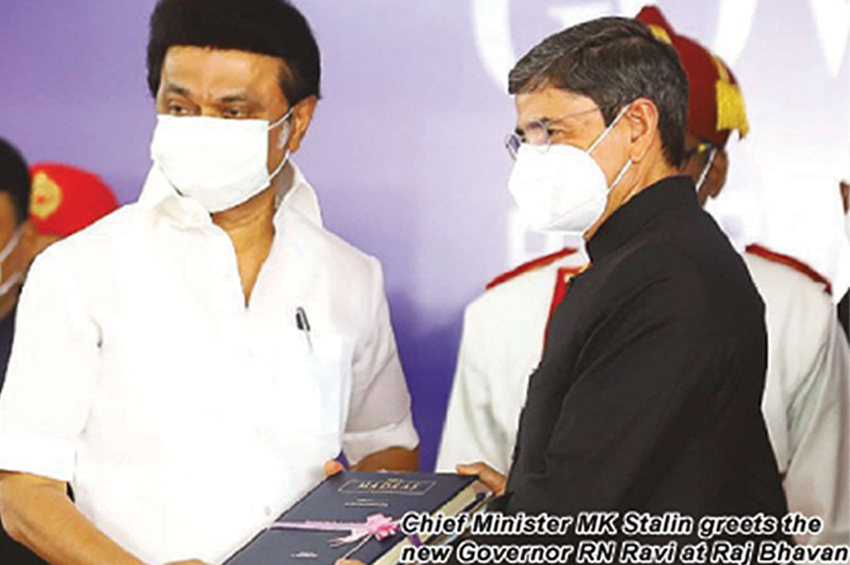A Mix of surprise and caution marked the political climate in Chennai when the President Ram Nath Kovind appointed former IPS and Intelligence Bureau (IB) official Ravindra Narayan Ravi as the new Governor of Tamil Nadu to succeed Banwarilal Purohit.
Despite the initial political reservations to the new appointment, particularly among the allies of the ruling DMK, Chief Minister M.K Stalin remained unruffled and warmly welcomed the new Governor after the incumbent Governor was shifted to Punjab. "Let your arrival encourage Tamil Nadu's growth and prosperity. Tamil Nadu welcomes you,” Mr Stalin said in a tweet, offering his Greetings to R.N Ravi.
Though the necessity of the post of Governor and the role of the Gubernatorial office has often been debated in the past, Mr Stalin did not hesitate to receive the new Governor with warmth and respect that is inherently attached to the high constitutional office.
As a strong regional party, the DMK, which has been in the forefront of the demand for state autonomy and more powers to the states, the Governor’s office, though, has not failed to draw flak since the 1950s in Tamil Nadu.
Perarignar Anna’s (DMK founder leader and former Chief Minister C N Annadurai) oft-quoted remarks “Aattukku thadium Naattukku Governorum thevai illai” (Just as a beard is redundant to a goat, so does the post of Governor to the state) flash in one’s mind whenever a new Governor is appointed or when the post is in the eye of a storm in Tamil Nadu.
Following the footsteps of Anna and Kalaignar M Karunanidhi, DMK has held the stand that the post of the Governor was ‘akin to the vestigial organ in a human body’, but the party never failed to give due honour and respect to the Gubernatorial post as long as it remains. This was amply evident again in the present Chief Minister M.K Stalin promptly welcoming the new Governor.
A few days later, Mr. R.N. Ravi was sworn in by Madras High Court Chief Justice Sanjib Banerjee on September 18. Mr Stalin, his cabinet colleagues, Union Minister L. Murugan, Leader of the Opposition Edappadi K Palaniswami, MDMK leader Vaiko, TMC leader G K Vasan were among others who graced the occasion at the Raj Bhavan.
The Left parties and the VCK ‘boycotted’ the swearing in alleging the Governor has been ‘appointed with a specific assignment’. The Congress was conspicuous by its absence at the ceremony, after the Tamil Nadu Congress President, K.S. Alagiri was the first to flag his party’s objection to former IPS officers being made Governors.
Mr. Alagiri even drew a parallel with what happened in neighbouring Puducherry where a former IPS officer, Kiran Bedi was constantly at loggerheads with its then Congress Chief Minister, V Narayanasamy in the last five years and expressed apprehension that something like that might be repeated in Tamil Nadu.
However, soon after being sworn in, the new Governor Mr. Ravi when asked about apprehensions about a former IB officer being made the Governor, promptly replied thus: “The slate of our relationship (between the Governor and the Government) is absolutely new and clean. My effort will be to make it as beautiful as possible in the days to come.”
The new Governor further said that he benefited enormously from the intellectual, spiritual and artistic wealth of Tamil Nadu and its political wisdom. “In fact, the place and the people have influenced and shaped to a great deal the very idea of India,” he said. Answering a question, he said Tamil Nadu had in place a popular government, mandated by the people. “Governance is the responsibility of the government. The Governor has to function within the parameters of the Constitution. I will try to keep that in mind,” he said.
On the performance of the DMK government, the new Governor said it was too premature for him to speak on it, but the government seemed to be doing well, especially in the way in which it had handled the Covid-19 and brought down the number of cases.
Born in Patna, Bihar, Mr Ravi joined the Indian Police Service (IPS) in 1976 and served in Kerala initially. Later, he served in the Central Bureau of Investigation (CBI) and IB. He had also served in the Joint Intelligence Committee in the Prime Minister’s Office and was appointed as the Deputy National Security Advisor in October 2018. A note from the Raj Bhavan said Mr Ravi (who was the Governor of Nagaland from August 1, 2019 to September 15, 2021) continue to discharge his responsibility as the Union Governments’ interlocutor for the Naga peace talks. But he later resigned from that post.
PAST FACE OFFS:
To put the issues in context, the DMK had in the past locked horns with the outgoing Governor, Mr. Purohit and had organized a series of black flag protests against him when he stepped out of the Raj Bhavan to visit districts and hold review meetings with the Collectors and officials during 2018. Mr Stalin had led an agitation and marched to ‘lay siege to the Raj Bhavan’ in Chennai accusing him of interfering with the State administration, notwithstanding DMK being in opposition then.
Yet, when Mr Purohit was transferred to Punjab, Mr Stalin, forgetting the past, extended a loving and respectful farewell to him. “We are bidding farewell to Purohit with love and respect,” he said and recalled the cordial ties he shared with the outgoing Governor, both as Leader of the Opposition earlier and as Chief Minister now. Mr Stalin extended the same cordiality to Mr. Ravi amid apprehensions that the BJP led-NDA in Delhi has deputed him to Tamil Nadu with a ‘hidden agenda’.
The DMK had always been in the forefront to ‘take on’ Governors whenever their conduct became questionable or when they infringed on the rights of the elected government. The party’s fight against Mr Purohit was a classic example. While relentlessly continuing the ‘black flag waving’ protest, Mr Stalin and his men had even earned the wrath of the Governor’s Secretariat but they stood unperturbed.
After Mr Stalin led his men to lay siege to the Raj Bhavan on June 24, 2018, the Governor’s Secretariat had issued a stiff warning that Governor enjoys "unhindered freedom" to interact with officials and cited legal provisions which read, ‘whoever tried to obstruct the Governor's work could be jailed for up to seven years.’ Not to be cowed down, Mr Stalin said, "not just seven years, even if we must remain in jail for the rest of our lives, we in the DMK will continue with our protests if the Governor carries on with his review meetings. We are prepared to make any sacrifice in the fight for protecting State autonomy propounded by Anna and Kalaignar.” The DMK ended the protest only after the Governor stopped his ‘review meetings’.
The DMK relied on the ‘Sarkaria Commission’ to fortify its stand on the role of Governors. The Commission, headed by Retired Supreme Court Judge Ranjith Singh Sarkaria was constituted by the then Congress regime at the Centre in 1983 to examine Centre-State relations. On appointment of Governors, the Commission said, “discarded and disgruntled politicians from the party in power in the Union, who could not be accommodated elsewhere, get appointed (as Governors). Such persons while in office, tend to function as agents of the Union government rather than as impartial constitutional functionaries.”
The post of Governor kicked up a row in Tamil Nadu as early as in 1952 when the then Governor Sri Prakasa invited Congress leader, C Rajagopalachari to form the government despite the fact that the Congress did not have a majority in the then Madras State and Rajaji himself did not contest in the elections.
In the 1990s’, Tamil Nadu witnessed a spell of infamous stand-off between former Chief Minister Jayalalithaa and the then Governor M Channa Reddy after the AIADMK came to power in 1991. The row between the two headstrong personalities was more like a clash of titans resulting in several unsavoury incidents.
In total contrast, Governor M Fathima Beevi became very close to Ms Jayalalithaa when the AIADMK staged a comeback in 2001 after suffering an ignominious defeat in the 1996 elections. Ms Beevi who made legal history as the first Indian woman Supreme Court Judge, was in the eye of a storm, when she sworn in Ms Jayalalithaa as Chief Minister despite the latter’s conviction in the TANSI land deal case. Ms Beevi later quit her post after the Union government demanded her resignation.
In the recent past, Maharashtra Governor Ch. Vidyasagar Rao, who was holding additional charge as Governor of Tamil Nadu since September 2016, had a tumultuous term after the death of Ms Jayalalithaa. He drew the opposition’s flak when he refused to call the Edappadi K Palaniswamiled government for a floor test after rebel leader TTV Dhinakaran walked away with 20 odd MLAs. When his aunt VK Sasikala staked claim to form the government, Rao stood his ground and refused to invite her. He chose to wait for the Supreme Court’s verdict on the appeals in the disproportionate assets cases against her.
For all the constitutional niceties and protocols to be observed in practice by a Chief Minister to the Governor of a State, history shows that the last word on the role of Governors is yet to be said.




